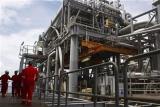
Hardening its stance, Sri Lanka has refused to sign a decade old agreement to lease the Trincomalee strategic oil storages to a unit of Indian Oil Corp (IOC) and is blocking the Indian firm's plans to set up a bitumen plant in the island nation.
In 2003, Lanka IOC - a subsidiary of state-owned IOC - bought one-third share in Ceylon Petroleum Storage Terminals Ltd which operates the China Bay tank farm. Ceylon Petroleum Corp (CPC) and Colombo entered into a MoU with Lanka IOC to grant a long-term lease to the Indian firm for operating the 99 storage tanks at Trincomalee for 35 years for an annual fee of USD 100,000.
However, the 35-year lease finalisation dragged on and now Colombo has reservations on leasing out 'state asset' to Lanka IOC, industry sources said.
Since commencing operations, Lanka IOC has invested close to USD 15 million at regular intervals in creating facilities like additional storage tanks, lube blending facilities and refurbishing of jetty.
It also wants to invest another USD 17 million in creating bitumen handling facilities at the tank farm and had applied to the Board of Investment (BOI) of Sri Lanka, they said adding BOI has told Lanka IOC that approval can be given only after settlement of lease issue.
Sources said with Sri Lanka government having reservations on leasing the facilities to Lanka IOC, the entire project is stuck.
Petroleum Secretary Vivek Rae has written to Foreign Secretary Sujatha Singh to take up the issue at the diplomatic level.
Lanka IOC, at the instance of Sri Lankan government, had in May submitted a proposal to operate the tank farms in a joint venture with CPC but there has been no response so far.
India voted against Sri Lanka in a US-sponsored resolution at the Human Rights Council in March, and has now downgraded its presence at the first multilateral CHOGM meeting in Colombo from the Prime Minister's level.
Right after the UN vote, the Sri Lankan government had announced it would renegotiate the tank farm agreement signed in 2003.
The China Bay tank farm, a World War II depot in Trincomalee, is the largest tank farm in South Asia and of great strategic value as it falls between the Middle East and Singapore.
Under privatisation, Colombo gave Lanka IOC the farm of 99 storage tanks, of which 15 are being used and two more are being refurbished at a cost of USD 17 million.
The 99 storage tanks and ancillary facilities are divided into 'upper' and 'lower' farms. The lower tank farm with 15 tanks is currently being utilised by Lanka IOC for storing and distribution of petroleum products. The upper tank farm consists of 84 tanks in an area of about 800 acres and is not being utilised presently except for storage of water in 4 tanks.





Comments
Add new comment